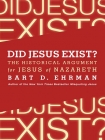Did Jesus Exist? - The Historical Argument for Jesus of Nazareth Bart Ehrman (books to read in your 20s txt) 📖

- Author: Bart Ehrman
Book online «Did Jesus Exist? - The Historical Argument for Jesus of Nazareth Bart Ehrman (books to read in your 20s txt) 📖». Author Bart Ehrman
The problem then with Jesus is that he cannot be removed from his time and transplanted into our own without simply creating him anew. When we create him anew we no longer have the Jesus of history but the Jesus of our own imagination, a monstrous invention created to serve our own purposes. But Jesus is not so easily moved and changed. He is powerfully resistant. He remains always in his own time. As Jesus fads come and go, as new Jesuses come to be invented and then pass away, as newer Jesuses come to take the place of the old, the real, historical Jesus continues to exist, back there in the past, the apocalyptic prophet who expected that a cataclysmic break would occur within his generation when God would destroy the forces of evil, bring in his kingdom, and install Jesus himself on the throne. This is the historical Jesus. And he is obviously far too historical for modern tastes. That is why so many Christians today try to reform him.
The Mythicist Agenda
IN MY VIEW HUMANISTS, agnostics, atheists, mythicists, and anyone else who does not advocate belief in Jesus would be better served to stress that the Jesus of history is not the Jesus of modern Christianity than to insist—wrongly and counterproductively—that Jesus never existed. Jesus did exist. He simply was not the person that most modern believers today think he was.
Why then do mythicists claim he did not exist? I am not asking what evidence mythicists offer for Jesus’s nonexistence. I have already considered the evidence and shown why it is problematic. I am asking the deeper question: What is driving the mythicists’ agenda? Why do they work so hard at showing that Jesus never really lived? I do not have a definitive answer to that question, but I do have a guess.
It is no accident that virtually all mythicists (in fact, all of them, to my knowledge) are either atheists or agnostics. The ones I know anything about are quite virulently, even militantly, atheist. On the surface that may make sense: who else would be invested in showing Jesus never existed? But when you think about it for a moment, it is not entirely logical. Whether or not Jesus existed is completely irrelevant to the question of whether God exists. So why would virulent atheists (or agnostics) be so invested in showing that Jesus did not exist?
It is important to realize the obvious fact that the mythicists all live in a Christian world for which Christianity is the religion of choice for the vast bulk of the population. Of course we have large numbers of Jews and Muslims among us and scattered Buddhists, Hindus, and other major faith traditions in our culture. But by and large the people we meet who are avidly religious are Christian. And mythicists are avidly antireligious. To debunk religion, then, one needs to undermine specifically the Christian form of religion. And what easier way is there to undermine Christianity than to claim that the figure at the heart of Christian worship and devotion never even existed but was invented, made up, created? If Christianity is based on Jesus, and Jesus never existed, where does that leave the religion of billions of the world’s population? It leaves it in total shambles, at least in the thinking of the mythicists. (One could easily argue that Christianity would survive quite well without a historical figure of Jesus, but that would be a different story and a different book.)
What this means is that, ironically, just as the secular humanists spend so much time at their annual meetings talking about religion, so too the mythicists who are so intent on showing that the historical Jesus never existed are not being driven by a historical concern. Their agenda is religious, and they are complicit in a religious ideology. They are not doing history; they are doing theology.
To be sure, they are doing their theology in order to oppose traditional religion. But the opposition is driven not by historical concerns but by religious ones.
But why would mythicists be so violently opposed to traditional religion? My sense is that it is because they believe that historic Christianity—the form of religion best known in the mythicists’ environment—has done and continues to do more harm than good in the world. They look at our educational systems and see fervent Christians working hard to promote ignorance over knowledge, for example, in the insistence that evolution is merely a theory and that creationism should be taught in the schools. They look at our society and see what incredible damage religion has done to human lives: from the sponsorship of slavery to the refusal to grant women reproductive rights to the denial of the possibility of gay love and marriage. They look at the political scene and see what awful political power the religious right yields: from imposing certain sets of religious beliefs on our society or in our schools to electing only those political figures who support certain religious agendas, no matter how hateful they may be toward other (poor, or non-American) human beings and how ignorant they may be about the world at large.
I have to admit that I have a good deal of sympathy with these concerns. But I am also a historian who thinks that it is important not to promote revisionist versions of the past for ideological reasons rooted in nonhistorical agendas. The writing of history should be done by following strict historical protocols. It is not simply a means of promoting a set of personal likes and dislikes.
I should also say that even though I happen to share some of the biases of many of the mythicists when it comes to harm that has been done over the years in the name of Christ (not just in crusades and inquisitions, but in our own society, right here, right now), I also see that a tremendous amount





Comments (0)